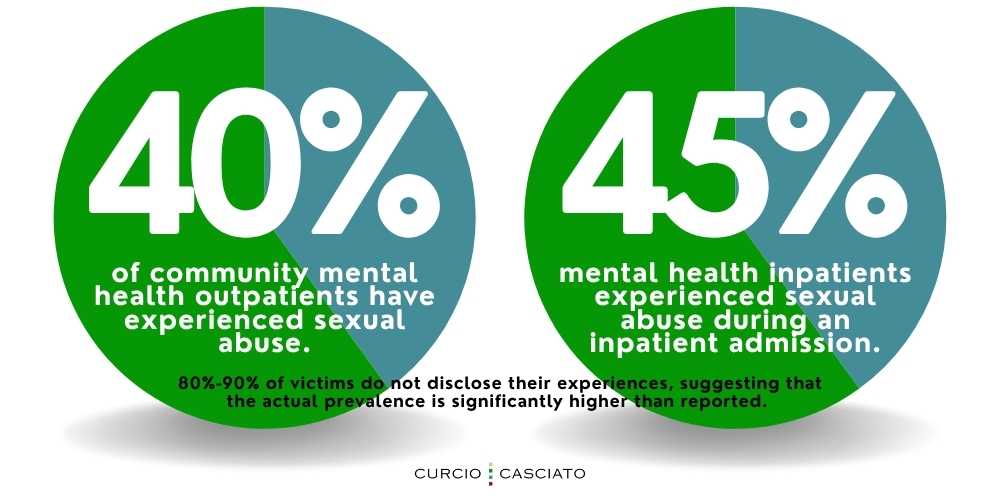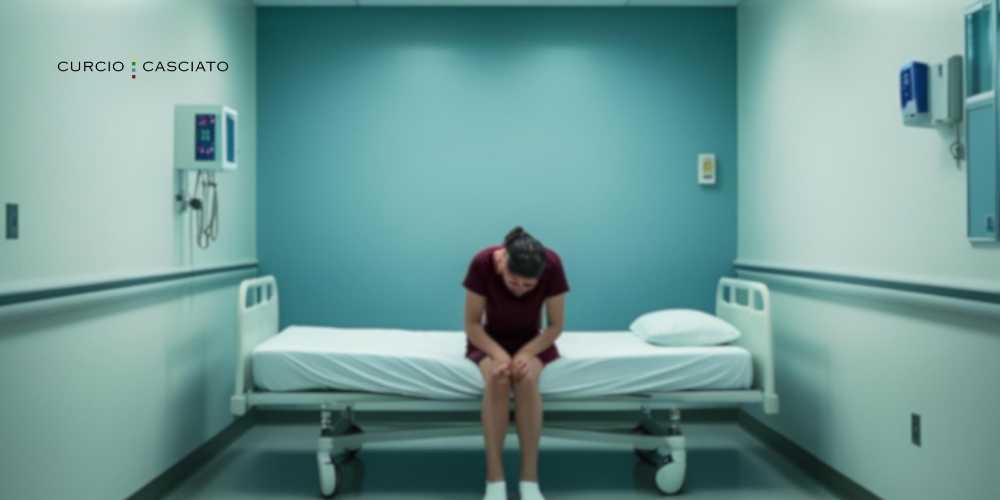Chicago Psychiatric Malpractice Lawyers
PRACTICE AREAS
The Chicago psychiatric malpractice lawyer team at Curcio & Casciato provides legal representation for victims who have suffered psychiatric abuse by mental health professionals. In Chicago, many psychiatric malpractice cases involve vulnerable individuals suffering from bipolar disorder, substance abuse disorders, PTSD, eating disorders, or other psychiatric conditions who are raped or assaulted by therapists, counselors, psychologists, psychiatrists, or other staff. Victims are often left with lasting physical harm, sexually transmitted diseases, suicidal ideation, or worsening mental illnesses than when they visited the mental health care professionals.
When facilities or mental health professionals work to mitigate reports or concerns, conceal rapes, or delay police response, this allows medical professionals to assault or harm vulnerable individuals unchecked. Understand that medical malpractice claims brought by psychiatric malpractice victims are not an isolated incident; this is a systematic failure of trusted medical professionals claiming to be providers of support for those with mental health conditions.
Our Chicago therapist malpractice lawyer team helps psychiatric malpractice victims and their families file psychiatric malpractice lawsuits and ensure all responsible parties are held liable for medical negligence. We take psychiatric malpractice cases on a contingency fee basis, so clients don’t owe any legal fees unless we secure a psychiatric malpractice settlement or jury award.
Call 312-321-1111 or fill out our online contact form to schedule a free consultation today.

Difference Between Behavioral and Psychiatric Medical Malpractice and Regular Health Care Medical Malpractice Cases
The difference between psychiatric medical malpractice and regular health care medical malpractice cases lies in the unique responsibilities of mental health professionals. Unlike general medical professionals treating conditions like diabetes or physical injuries, mental health care professionals must manage sensitive mental illnesses such as depression, bipolar disorder, and schizophrenia.
Psychiatric malpractice cases often involve issues like emotional distress, psychiatric abuse, medication errors, improper treatment, or failure to prevent patients from self-harm or suicide.
Because of the sensitive nature of mental health treatment, psychiatric malpractice victims face unique challenges in proving a breach of the duty of care. An experienced medical malpractice attorney can help gather evidence, consult with psychiatric experts, and file a psychiatric malpractice lawsuit to pursue compensation for any harm or injuries suffered.
If you were a previously injured patient, contact our Chicago psychiatric malpractice lawyer team for a free consultation to discuss your legal options.
Why is Psychiatric Hospital Rape Common?
Psychiatric hospital rape is common because the behavioral and mental health industry sacrifices the standard of care for for profit, creating situations where medical malpractice, in general thrives.
According to a recent study, up to 45% of inpatients in mental health treatment facilities experienced sexual violence, while 40% of mental health outpatients reported sexual assault as adolescents. More research found that 36% of treatment facility directors had dealt with staff on resident sexual assault allegations. Additionally, 3% of psychiatric nurses reported being sexually assaulted.
Sexual assaults and rapes often go unreported because therapists and specialists choose to avoid mental health malpractice lawsuits over protecting the victim, allowing the conduct and neglect to continue without public knowledge.
Examples of Counselor and Therapist Sexual Abuse Cases Our Chicago Psychiatric Malpractice Law Firm Handles

Behavioral Health Hospital Sexual Assault
Behavioral health sexual assault is a severe type of psychiatric malpractice involving the exploitation of vulnerable patients by staff or others. These violations often result in trauma and the deterioration of existing conditions. Due to the sensitive nature of these incidents, victims of psychiatric malpractice may pursue a claim against the specialist or facility to hold those responsible liable. A Chicago psychiatric malpractice attorney can gather evidence, prove the cause of harm, and seek compensation on clients’ behalf.
Mental Health Facility Sexual Assault
Sexual assault in a mental health facility is a serious violation of a patient’s safety and a clear instance of psychiatric malpractice. When mental health professionals or staff at treatment facilities fail to protect vulnerable individuals, the result can be devastating emotional distress, physical trauma, and lasting damage. Victims may file a psychiatric malpractice lawsuit with the help of a Chicago therapist sexual abuse lawyer to hold the responsible parties liable and seek compensation for the harm endured.
Psychiatric Abuse at Substance Abuse Facilities
Psychiatric abuse at substance abuse facilities often involves coercive tactics, verbal degradation, or neglect by counselors and therapists responsible for care. These environments are meant to support recovery, but when mental health care professionals engage in or allow abusive conduct, it can worsen existing mental health conditions. Legal action may be necessary to hold providers accountable and address the injury suffered due to this misconduct. Contact a Chicago substance abuse malpractice lawyer to learn more.
Doctor and Therapist Sexual Assault
Sexual assault by therapists and doctors is a serious violation of trust and professional ethics, often resulting in long-lasting trauma. Inappropriate relationships or coercion during treatment constitute a breach of professional standards. Victims in Illinois can seek justice through malpractice lawsuits with help from a Chicago therapist sexual abuse lawyer who understands the legal complexities of these highly sensitive cases. Legal representation can help victims pursue accountability and secure financial recovery for the harm endured.
Psychiatric Abuse In Therapeutic Foster Care Settings
Abuse in therapeutic foster care settings can involve physical mistreatment, sexual misconduct, or psychological harm inflicted by caregivers or staff responsible for vulnerable children with complex mental health conditions. These children often require specialized help, but when mental health professionals fail to uphold appropriate duties of care, children suffer developmental harm. Victims may be entitled to pursue legal action to hold those responsible liable and seek compensation for the harm suffered. A Chicago therapist malpractice lawyer can help.
Montrose Behavioral Health and Timberline Knolls Claims
The Timberline Knolls scandal drew national attention after survivors came forward with allegations of sexual assault, emotional abuse, and systemic failure within the facility, including failure to protect victims from known risks. Reports include rapes by staff, failure to monitor known predators, and a widespread lack of management oversight within the behavioral heath treatment facility. These allegations have raised concerns about Montrose Behavioral Health Hospital, another Illinois facility operated by Acadia Healthcare. A Chicago Timberline Knolls lawsuit attorney can help victims pursue legal action, seek damages for the harm suffered, and hold all responsible parties accountable under Illinois state law.
Examples of Psychiatric Malpractice Cases Our Chicago Mental Health Attorney Team Handles
Medication Errors and Overmedication
Medication errors and overmedication are serious types of psychiatric malpractice cases that can cause lasting harm to individuals with mental health conditions. When mental health professionals fail to properly monitor dosages, ignore interactions, or prescribe the wrong medications, the result can include severe emotional distress, worsening of mental health conditions, or even death. Medication errors often occur in behavioral and mental health treatment facilities or during therapy provided by mental health care providers.
A Chicago mental health medical malpractice attorney can investigate whether medical negligence in prescribing or managing medications was the direct cause of injuries, helping victims seek justice and recover medical expenses, lost wages, and other damages.
Failure to Prevent Suicide or Self-Harm
Failure to prevent suicide or self-harm is a critical type of psychiatric malpractice case that often results from mental health professionals failing to conduct proper risk assessments or neglecting to implement safety protocols or monitor high-risk individuals. These breaches of the duty of care can lead to devastating outcomes for those struggling with depression, anxiety, or bipolar disorder. When mental health professionals fail to act, the consequences may include severe emotional distress, long-term psychological trauma, or suicide. An experienced Chicago psychiatric medical malpractice attorney can help victims and their families pursue medical malpractice claims, work to make sure negligent providers are held liable, and seek compensation for medical expenses, lost wages, and emotional suffering.
Breach of Confidentiality and HIPAA Violations
Breach of confidentiality and HIPAA violations in psychiatric malpractice cases can severely damage a vulnerable individual’s trust and emotionally damage their well-being. When mental health professionals or mental health treatment centers improperly disclose sensitive information, it may lead to emotional distress, stigma, or harm in relationships. Breach of confidentiality violations often involve mental health professionals failing to follow privacy laws or mishandling protected records.
An experienced medical malpractice attorney can investigate whether the breach was a violation of professional standards, notify the licensing board, and pursue a psychiatric malpractice lawsuit to hold the responsible medical professional or institution liable, and help victims pursue damages.
Failure To Get Informed Consent
Failure to obtain informed consent is a serious type of psychiatric malpractice case that can result in significant harm to vulnerable individuals undergoing behavioral or psychiatric treatment. Mental health professionals are legally required to explain the risks, benefits, and alternatives of any proposed therapy or medication before proceeding. When therapists or specialists fail to meet this duty, individuals may unknowingly agree to improper treatment or dangerous medication errors, leading to physical complications. A Chicago therapist malpractice attorney can help victims prove negligence, pursue a psychiatric malpractice claim, and seek compensation for the resulting harm.
Improper Treatments or Use of Restraints
Improper treatment or misuse of restraints by mental health professionals is a serious concern in many psychiatric malpractice cases. When mental health professionals use physical or chemical restraints without medical necessity, this violates standards of care. This often occurs in inpatient or treatment centers, where vulnerable people rely on providers to act within medical and state laws. A Chicago psychiatric malpractice lawyer can help victims pursue compensation for any injuries, lost wages, and related medical expenses.
Staff Assaults and Physical Injuries Caused By Other Patients
Assaults by staff or other patients in psychiatric treatment centers represent a serious type of psychiatric malpractice case that violates a provider’s legal duty. Therapists and facility administrators are legally responsible for preventing harm. When they fail to monitor interactions, ignore threats, or allow unsafe conditions to persist, vulnerable individuals may suffer injuries or lasting trauma. A Chicago therapist malpractice attorney can help victims pursue justice and compensation through a psychiatric malpractice claim.
Misdiagnosis or Wrong Diagnosis
Misdiagnosis or wrong diagnosis in psychiatric malpractice cases can lead to severe consequences for those with psychiatric conditions. When therapists don’t accurately identify disorders like bipolar disorder, schizophrenia, or depression, the resulting care or medication errors can worsen symptoms, delay recovery, or cause new health complications. These errors often stem from neglecting critical symptoms, ignoring histories, or failing to consult with other psychiatric experts. A Chicago medical misdiagnosis attorney can evaluate whether negligence occurred, help victims pursue medical malpractice claims, and pursue compensation for the harm suffered.

How a Chicago Psychologist Malpractice Lawyer Can Help
A Chicago psychologist malpractice lawyer can help victims hold negligent providers liable for harm caused by misdiagnosis, sexual assaults, or failure to meet established standards of care. Our legal professionals understand the complexities of psychiatric malpractice cases, including those resulting in emotional distress, psychiatric abuse, or improper therapy practices. Our Chicago psychiatric malpractice lawyer team works to gather evidence, consult with psychiatric experts, and build strong medical malpractice claims that clearly show the provider’s actions were a direct cause of the harm suffered. Victims can seek compensation for medical expenses, lost wages, and psychological harm through a properly filed psychiatric malpractice lawsuit.
How a Chicago Therapist Sexual Abuse Lawyer Can Help Ensure Perpetrators Are Held Liable
A Chicago therapist sexual abuse lawyer helps victims seek compensation by performing thorough investigations, identifying liable providers, and building strong medical malpractice claims. Our psychiatric malpractice attorneys in Chicago handle the entire medical malpractice claims process, file therapy malpractice lawsuits, and seek punitive damage when violence, rapes, or other forms of medical negligence occurs.
An experienced Chicago psychiatric hospital sexual assault attorney will obtain the facility’s records to expose prior reports and prove neglect or abuse at every level possible. Our Chicago psychiatric malpractice lawyers advocate aggressively on behalf of clients, helping to ensure the mental health industry stops enabling abuse of vulnerable individuals.
Illinois Psychiatric Malpractice Settlements
Illinois psychiatric malpractice settlements vary based on factors like the severity of harm, the extent of negligence, and the impact on the client’s life. While psychiatric malpractice settlement amounts can differ, the state does not impose caps on medical malpractice damages, allowing for potentially substantial compensation in cases of significant injury or misconduct. Victims pursuing psychiatric malpractice claims may seek damages for medical expenses, lost wages, and other related losses. Consulting with a Chicago psychiatric malpractice attorney can provide legal guidance on the legal process and potential settlement value of an individual medical malpractice claim.
Illinois Statute of Limitations for Malpractice Lawsuits
The Illinois state statute of limitations for sexual abuse victims allows most people up to 30 years from the date of the act or discovery to file a claim. In children’s cases, victims may have more time. Consulting a Chicago mental health lawyer can help ensure claims are filed within the state’s time limitations.

List of Chicago Psychiatric and Mental Health Facilities
Here is a list of psychiatric and mental health facilities in Chicago:
City-Operated Mental Health Centers in Chicago, Illinois
- Englewood West 63rd Street Health Hub
- Bronzeville East 43rd Street Health Hub
- Greater Lawn West 55th Street Health Hub
- Lawndale South Western Avenue Health Clinic
- North Park North Pulaski Health Clinic
- Pilsen South Ashland Health Hub
- Roseland East 115th Street Health Hub
- Legler Regional Library Mental Health Services
Private and Nonprofit Mental Health Facilities in Chicago, Illinois
- Chicago Behavioral Hospital
- Compass Health Center
- Hartgrove Behavioral Health System
- Garfield Park Behavioral Hospital
- Trilogy Behavioral Healthcare
- Montrose Behavioral Health Hospital
- Pilsen Wellness Center
- Center on Halsted
Hospital-Based Psychiatric Services in Chicago, Illinois
- Norman and Ida Stone Institute of Psychiatry at Northwestern Memorial Hospital
- UChicago Medicine Inpatient Psychiatric Care
State-Operated Mental Health Facilities in Chicago
Chicago-Read Mental Health Center
Chicago Psychiatric Malpractice Attorney
If you or a loved one has suffered harm due to negligent mental health treatment, our Chicago medical negligence attorneys can help. Whether the psychiatric malpractice case involves misdiagnosis, prescribing incorrect medications, sexual or physical abuse, or failure to protect vulnerable people, a qualified Chicago psychiatric malpractice attorney can evaluate your claim and pursue accountability. To learn your legal options, call 312-321-1111 or fill out our contact form to schedule a free and confidential consultation today.


